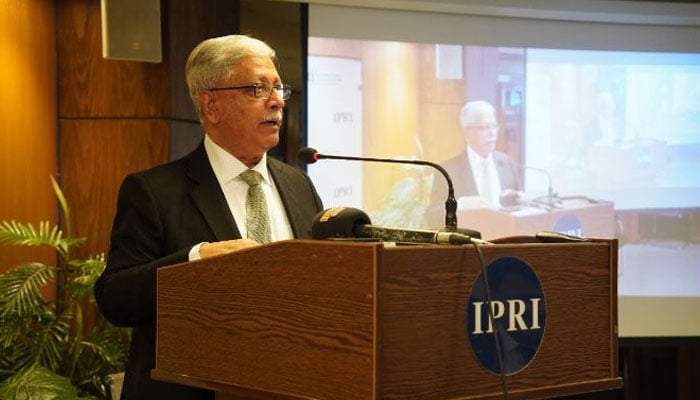Lecture on ‘Evolution of Pakistan’s full spectrum deterrence policy’
Islamabad: The Islamabad Policy Research Institute (IPRI) marked ‘Youm-e-Takbeer’ with an insightful lecture by Lt. General (r) Khalid Kidwai, adviser to the National Command Authority (NCA) and former director general of the Strategic Plans Division (SPD), says a press release.
The lecture focused on the evolution of Pakistan’s Full Spectrum Deterrence Policy. Lt. General Kidwai paid tribute to the past civil and military decision-makers and the silent workers who contributed to the development and operationalisation of Pakistan’s nuclear capability. He highlighted that Pakistan’s nuclear programme was driven by its defence needs, especially after the trauma of the 1971 war and India’s nuclear explosion in 1974. The nuclear capability was acquired to offset the conventional forces’ asymmetry with India.
He elaborated on the development of Pakistan’s nuclear command and control architecture, featuring institutions like the NCA and SPD, which brought greater synergy in planning and development. The triad of strategic forces, comprising the Army, Air Force, and Navy’s Strategic Force Commands, along with compliance with international safety protocols, gave Pakistan a clear competitive edge over India. Lt. General Kidwai discussed the transition from ‘Credible Minimum Deterrence’ to ‘Full Spectrum Deterrence’ and its strategic effects, which have caused a dilemma for Indian strategic planners. He emphasised that Pakistan’s tactical nuclear capability, acquired in 2011, has effectively countered India’s conventional warfighting concepts.
The lecture also addressed the 2019 Balakot incident, highlighting Pakistan Air Force’s effective response, which stymied Indian escalation. Lt. General Kidwai noted that Pakistan’s Full Spectrum Deterrence remains robust, and any amateurish sabre-rattling by Indian political and military leadership would result in further embarrassment for them. He criticised the inflammatory statements by Indian officials regarding Azad Jammu and Kashmir, stressing that Pakistan, secure under Full Spectrum Deterrence, does not adhere to a ‘No First Use’ policy, making no place in India safe in case of any misadventure.
Lt. General Kidwai concluded by stating that Pakistan’s nuclear deterrence has significantly altered Indian warfighting concepts, inducing a regression in their politico-military options. The commemoration of May 28th serves as a reminder of Pakistan’s nuclear capability and the resilience of its people who have overcome nuclear blackmail through perseverance.
-
 Katie Price Seen With New Hubby Lee Andrews Weeks After Tying The Knot
Katie Price Seen With New Hubby Lee Andrews Weeks After Tying The Knot -
 Biggest Order Yet Issued Against Andrew Mountbatten-Windsor: King Charles You Have To’
Biggest Order Yet Issued Against Andrew Mountbatten-Windsor: King Charles You Have To’ -
 ByteDance’s Seedance 2.0 Marks New Era Of Cinematic AI-generated Videos: Here’s How
ByteDance’s Seedance 2.0 Marks New Era Of Cinematic AI-generated Videos: Here’s How -
 Struggling With Obesity? Here's How To Manage It
Struggling With Obesity? Here's How To Manage It -
 How Epstein Scandals Are Impacting King Charles’ Healing As Stress Refuses To Relent: ‘Could Spell His End’
How Epstein Scandals Are Impacting King Charles’ Healing As Stress Refuses To Relent: ‘Could Spell His End’ -
 Ciara, Russell Wilson Become Matchmakers For Pals?
Ciara, Russell Wilson Become Matchmakers For Pals? -
 Why Prince William Releases Statement On Epstein Scandal Amid Most 'challenging' Diplomatic Trip?
Why Prince William Releases Statement On Epstein Scandal Amid Most 'challenging' Diplomatic Trip? -
 Historic Mental Health Facility Closes Its Doors
Historic Mental Health Facility Closes Its Doors -
 Top 5 Easy Hair Fall Remedies For The Winter
Top 5 Easy Hair Fall Remedies For The Winter -
 Japan Elections: Stock Surges Record High As PM Sanae Takaichi Secures Historic Victory
Japan Elections: Stock Surges Record High As PM Sanae Takaichi Secures Historic Victory -
 Prince William, Kate Middleton Finally Address Epstein Scandal For First Time: 'Deeply Concerned'
Prince William, Kate Middleton Finally Address Epstein Scandal For First Time: 'Deeply Concerned' -
 Kim Kardashian Promised THIS To Lewis Hamilton At The 2026 Super Bowl?
Kim Kardashian Promised THIS To Lewis Hamilton At The 2026 Super Bowl? -
 Andrew Mountbatten-Windsor Throws King Charles A Diplomatic Crisis
Andrew Mountbatten-Windsor Throws King Charles A Diplomatic Crisis -
 Barack Obama Hails Seahawks Super Bowl Win, Calls Defense ‘special’
Barack Obama Hails Seahawks Super Bowl Win, Calls Defense ‘special’ -
 Pregnant Women With Depression Likely To Have Kids With Autism
Pregnant Women With Depression Likely To Have Kids With Autism -
 $44B Sent By Mistake: South Korea Demands Tougher Crypto Regulations
$44B Sent By Mistake: South Korea Demands Tougher Crypto Regulations




